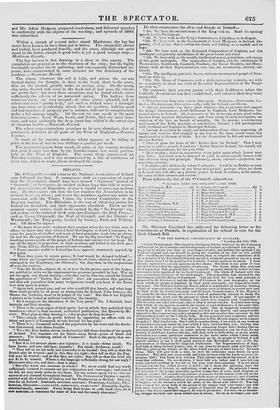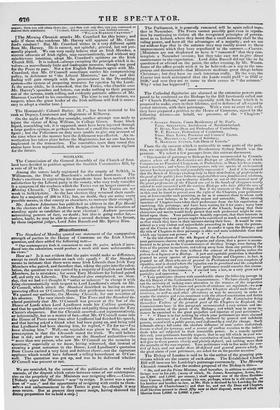Mr. Sharman Crawford has addressed the following letter to his
constituents at Dundalk, in explanation of his refusal to vote for the Irish Church Bill.
" TO TOE LIBERAL CONSTITUENCY OF DI7 NDA LK.
" London, 5th July 1836.
" Fellow Countrymen-The donation of religious liberty tendered by the Commons
of England to the Catholics and Presbyterians of Ireland, was debated last night. I am proud to inform you that, as y our Representative, and holding the opinions I do, I did not degrade you, nor myself, by giving the sanction of my vote to this pitiful offer-insulting no less as respects time amount. titan as respects the conditions of it. As a member of ow Established Church myself, I would not present to you as a boon that nhich, were I in the position or a Catholic, I would spurn as an insult. I have already explained to v on my opinions on this clause. But there is one point of view 14 hieil I had not then the opportunity of enforcing. The Lords, when they rebutted the Corporation Bill, proposed that the corporate property should be vested in Com- missioners to be appointed by the Lord-Lieutenant. l'he whole of Ireland said this was an insulting mockery of the Irish people. The proposition was rejected by the Government and the house of Commons. And yet here the very same principle is proposed by the Government and the House if Commons fur your acceptance. as the boon which the people of England. in their great generosity, are disposed to confer upon you. The National Educatiou Board, which is constituted of members forming a kind of representation of the different religious sects in Ireland, is passed over, and, hi their stead, the Lord Lieutenant and the Loots Commissioners of his Majesty's Treasury for the time being. are to have a kind of partnership concern in fixing the conditions of the grant and the persons to whom It is to be paid. If you approve of this principle as respects your Schools, why reject it as respects your Corporations? This is w hat was rated last night; this is what I did not vote Pr. I retired from doing that which, in my opinion, would be the record of your dishonour ; at the same time, I did not Vote with the opponents or your rights. But an important consideration arises in my Mint, I do not disguise from you that I am directly and unequivocally opposed to the compromising policy adopted on this and on other late occasions by the distinguished leader of the catholic body. lie has possessed your confidence and the confidence of his countrymen. Now the question is this. Do you require me to support his policy.? That I will rot do. But I will do another thing; I am ready at any moment to surrender into your hands the trust which 1 have received from you. Feeling that I cannot be of the least possible service by remaining longer here-feeling that no practical good has been done, or, tinder present circumstances. can be done, fur my country, I shall leave London this day, and shall. with as little delay as in my power, forward to you a more particular statement of the views under which I have acted. On your approval, and on the course determined on by the people of Ireland. it will depend whether or not I shall again return to this Metropolis as one of the Re- presentatives of Ireland in the Impenial Parliament. The Representatives of Eng- land talk of doing Ireland justice; but, if you come to the point, what will they do ? Will they give up the tribute of the slave, which you pay to their Church? No such thing. They will give bock a mite, to rivet the remainder more firmly on your shoulders. Will they now conic, really and truly, to issue with the Lords on your ('or. poration Bill? You know they will not. They already sacrificed the chance of it to avoid that collision,. My countrymen. I have told you before and I now tell you again, you have nothing to depend on but your own determination. I 110 not mean resistance to the law, either yassire or act ire ; l ut I mean the enforcing, from the Representatives of Ireland, an unflinching stand ea principle. By principle I mean the interests of the People generally, against n.ono?olies of every kind. religious or political-against the wasteful expenditure of taxation for the benefit atilt' len' to the injury n 1 I he ma by. Mein ity these objects with the name of your con nii ry ; and if justice be not 00111. II, Ireland, command your Itepresentatirea to interpose to the granting of Supplies :ill the obstacles which the forms of the House will admit uf. You will then ronnert the great body or the people of the empire with your cause; you will then have .Insure or Repeal. The people of Englund may bti disposed to do you justice but if yttia expect their support, be true to yonrselves. Let there be no bluster- tug swagger iu words and mean submission in actiuu. Act so as to obtain your owl respect; then you will obtain theirs also ; ant then, and only then, can you command or deserve their assistance. " I remain, fellow countrymen, year faithful servant, WILLIAM SHARMAN en•WFORD."
[The Morning Chronicle attacks Mr. Crawford for this letter ; and asks if those who condemn Mr. Harvey will approve of Mr. Craw- ford's conduct ? But Mr. Crawford writes in a very different spirit from Mr. Harvey. He is earnest, not spiteful ; grieved, but not per- sonally piqued. We can very easily believe that an Irish Member, a sincere advocate of Irish rights, may conscientiously, and without any mischievous intention, adopt Mr. Crawford's opinions on the Irish Church Bill. It is indeed—always excepting the principle which it in- volves—a marvellously little and inadequate measure, though too good for the Peers to pass. Not a few English Reformers agree with Mr. Crawford, that Mr. O'Connell sometimes carries his compromising policy, in deference to " the Liberal Ministers," too far ; and this feeling will gain strength with the perseverance in the Do-nothing system—the system of proposing measures for rejection by the Lords. In the mean while, be it remarked, that the Tories, who chuckle over Mr. Harvey's speeches and letters, can make nothing to their purpose out of the serious, truth-telling, and evidently patriotic address of Mr. Sharman Crawford to his constituents. The time is not far distant, we suspect, when the great leader of the Irish millions will find it neces- sary to adopt a similar tone.]



























 Previous page
Previous page